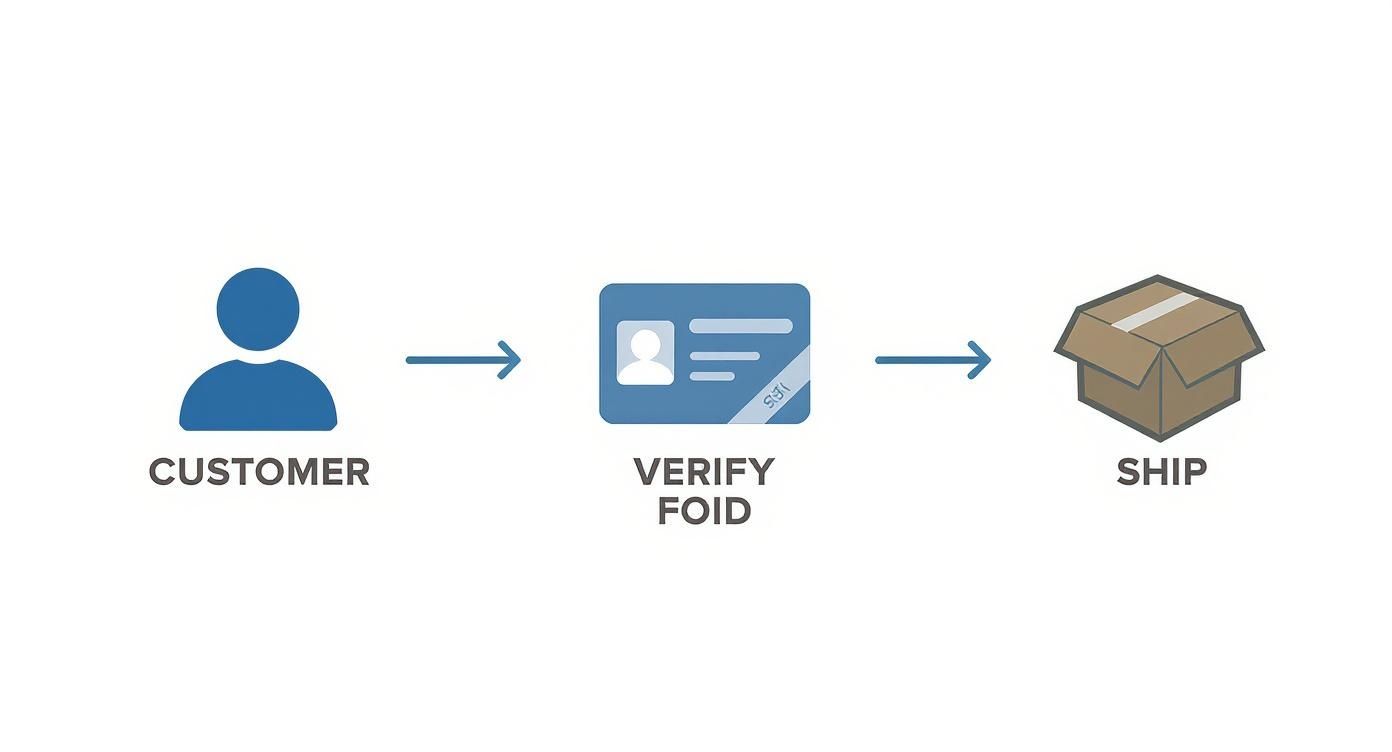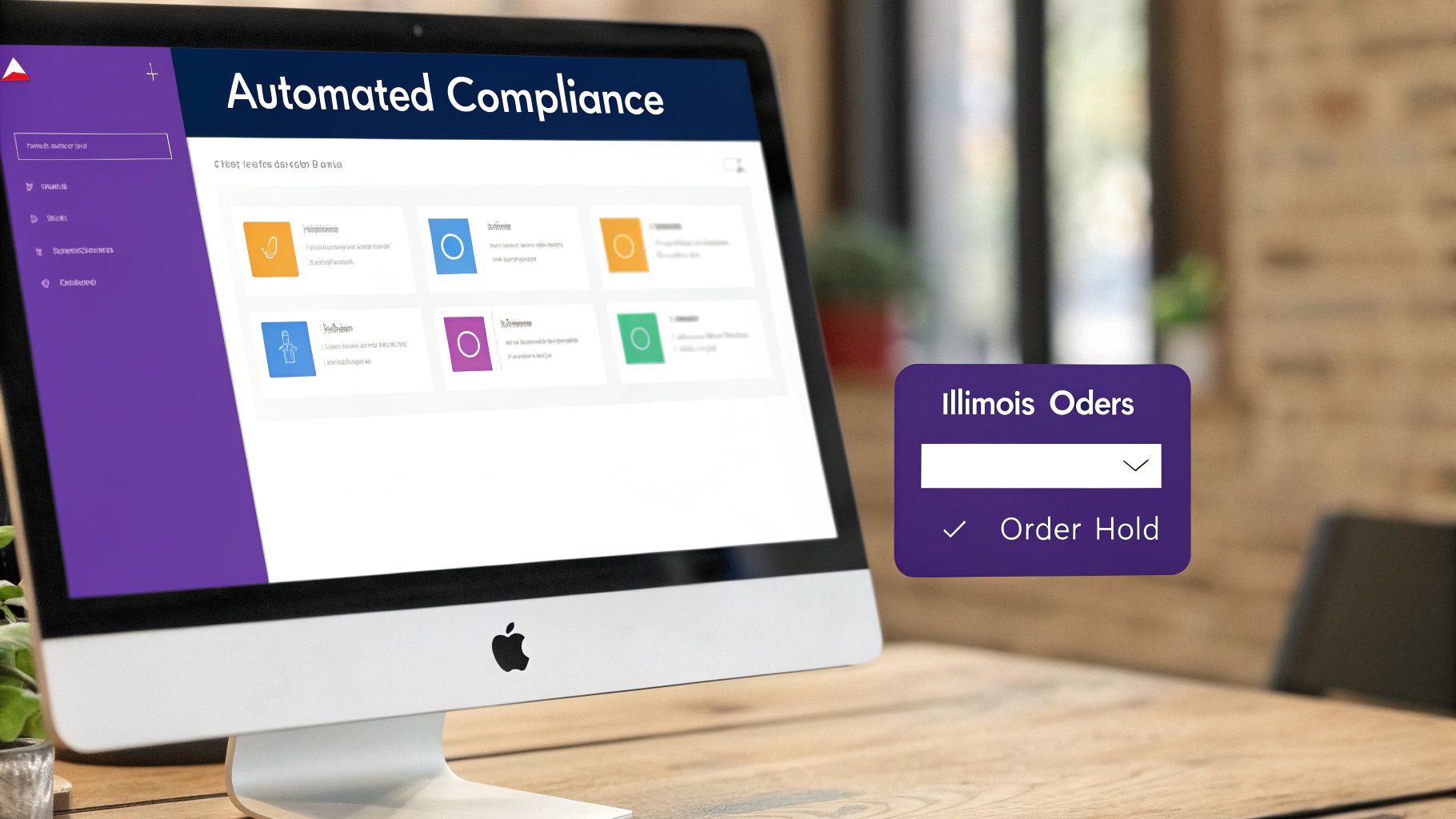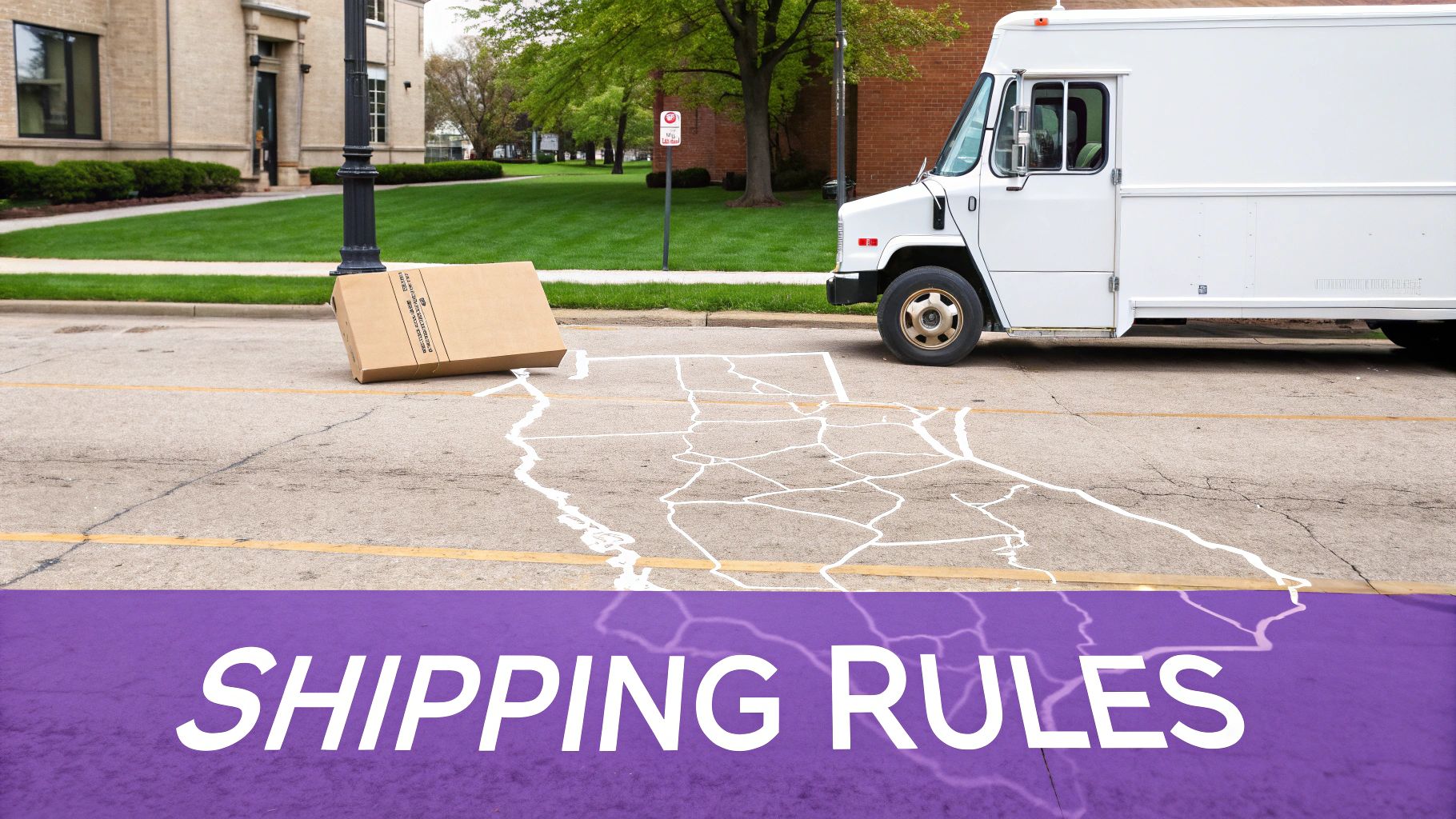
Illinois FOID card shipping requirements e-commerce Guide
Illinois FOID card shipping requirements e-commerce: learn verified checkout, compliant packaging, and secure shipping to stay compliant and avoid penalties.
Cody Y.
Updated on Nov 21, 2025
If you're selling firearms or ammunition online to customers in Illinois, there's one piece of legislation you absolutely must get right: the Firearm Owners Identification (FOID) Card Act. This state law is the backbone of your entire e-commerce compliance strategy, dictating everything from how you verify a customer's identity to the final steps before an item leaves your warehouse.
Understanding Illinois FOID Rules for Online Sales
Navigating the Illinois FOID card shipping requirements can feel a bit daunting at first, but it all comes down to a single, straightforward mandate. As an online seller, you are legally on the hook for making sure every Illinois customer is eligible to buy your products. This isn't a friendly suggestion—it’s a legal requirement that governs every single firearm and ammunition transaction in the state.
The compliance clock starts ticking the second an Illinois shopper adds a restricted item to their cart. Before you even begin to think about packing a box, you have to collect and verify a valid copy of their FOID card, usually alongside their state-issued ID.
The Legal Framework for E-Commerce Sellers
Your core responsibilities are laid out in the Firearm Owners Identification Card Act (430 ILCS 65/). The law is crystal clear: a resident needs a valid FOID card to legally acquire or possess firearms and ammunition. For your online store, this translates into a non-negotiable requirement to have a system in place to check these credentials before you ship anything. The law doesn't care if the sale happens in a storefront or on a website; the fundamental check is the same. You can dive into the specifics by reviewing the official act directly.
This check is more than a simple visual inspection of a card. It often requires a formal verification with the Illinois State Police (ISP) to confirm the card is active and in good standing. This isn't just about red tape; it’s a critical step that protects your business from massive liability and helps ensure public safety.
Key Takeaway: An order shipping to Illinois isn’t truly complete until you've successfully verified the customer's FOID card. The smartest way to stay compliant is to treat this verification as the very first gate in your fulfillment workflow.
Firearms vs. Ammunition: What You Need to Know
While both firearms and ammunition sales fall under the FOID Act, the shipping logistics are completely different. This is a crucial distinction for setting up your e-commerce rules.
When you sell a firearm, you can't just ship it to the customer's house. Federal and state law requires you to route the package to a licensed dealer, known as a Federal Firearms Licensee (FFL), located in Illinois. The customer then goes to that local FFL to complete the final paperwork and background check in person.
Ammunition, on the other hand, can typically be shipped directly to the customer's residential address—but only after you’ve verified their FOID card. Our guide on understanding FFL requirements breaks down the different FFL types and their roles. Your online store's logic needs to be smart enough to differentiate between these product categories to apply the correct shipping restrictions at checkout.
To make things clearer, here's a quick rundown of the essential steps you'll need to follow.
Quick Compliance Checklist for Illinois E-Commerce Shipments
This table summarizes the core compliance actions for shipping firearms and ammunition to Illinois residents. It's a great starting point for building out your standard operating procedures.
| Requirement | Firearms | Ammunition |
|---|---|---|
| FOID Card Verification | Required before shipping to FFL | Required before shipping to customer |
| State ID Verification | Required alongside FOID card | Required alongside FOID card |
| ISP Eligibility Check | Required to confirm FOID status | Required to confirm FOID status |
| Shipping Destination | Must ship to a licensed FFL in Illinois | Can ship directly to customer's address |
| Final Transfer | Customer completes 4473/background check at FFL | No in-person transfer required |
| Recordkeeping | Maintain FOID, ID, and FFL transfer records | Maintain FOID and ID verification records |
Think of this checklist as your baseline. Getting these steps right every time is the key to running a compliant and successful e-commerce operation in Illinois. Missing just one can lead to returned shipments, frustrated customers, and serious legal trouble.
Building a Compliant E-Commerce Verification Workflow
Translating Illinois law into a smooth checkout experience is where the rubber meets the road. Your main goal here is to build a workflow that grabs the necessary documents—the FOID card and a matching state ID—without making your customers want to pull their hair out. How you collect this information is the first, and arguably most important, step in your entire fulfillment process.
An easy way to handle this is to add a mandatory file upload field right on your checkout page for any customer with an Illinois address. Most e-commerce platforms can handle this. When a customer types in an Illinois shipping address, these fields pop up, forcing them to upload images of their documents before they can hit "complete purchase." This simple step ensures you have what you need from the get-go.
This flow chart breaks down the basic steps for a compliant Illinois gun or ammunition sale, from the moment a customer clicks "buy" to the final shipment.

As you can see, that verification step is the critical gatekeeper between an order being placed and a box leaving your warehouse.
Structuring Your Internal Process
Once an order comes in with the uploaded documents, the next phase of your workflow kicks in. This part involves a manual or semi-automated review of the FOID card and state ID. You've got to confirm that the names and addresses on both documents match up and, of course, that neither card has expired.
But the most crucial step is running the verification check with the Illinois State Police (ISP). This is not optional. You absolutely must use the information provided to confirm the FOID card's validity through the state’s official channels before you can legally ship ammunition to the customer or a firearm to their FFL.
Expert Tip: Immediately place all new Illinois orders into an "On Hold" or "Awaiting Verification" status. This one simple change prevents your fulfillment team from accidentally packing and shipping an order before the mandatory ISP check is complete. Think of it as a cheap but effective insurance policy.
Managing the ISP Verification Timeline
A huge factor you need to build into your workflow is the ISP's response time. Sometimes the checks are quick, but the law gives the ISP up to 30 days to respond. This potential delay has to be baked into your fulfillment timeline and, just as importantly, communicated clearly to your customers.
Don't make promises of "next-day shipping" for Illinois orders—it'll only lead to headaches. Instead, set realistic expectations. A simple note on the product page or at checkout explaining that Illinois orders require a state-mandated verification process that might affect shipping times goes a long way. This transparency helps manage expectations and cuts down on "where's my order?" emails.
For stores with a high volume of Illinois sales, it might be worth looking into your site's technical foundation. Understanding how an Ecommerce Microservices Architecture can support specific, isolated compliance features is a game-changer. This approach lets you manage things like document uploads and verification status tracking without bogging down your entire storefront. It's a more advanced strategy, but definitely something to consider as you scale.
Just remember, the FOID check is only one piece of the puzzle. Federal compliance is a whole other layer. For a deeper dive, you can learn more about how ATF Form 4473 applies to e-commerce for firearm sales. A truly solid workflow accounts for all state and federal requirements, making sure every single shipment is buttoned up and fully compliant.
Automating Compliance in Your Online Store

If you're still manually checking every single order coming out of Illinois, you're playing with fire. It's not just a massive time sink; it's a guaranteed way to let human error creep into a process that has zero tolerance for mistakes. One slip-up, one order that ships a day too early, can snowball into a legal and financial nightmare.
This is exactly where automation becomes your best friend for handling Illinois's FOID card shipping rules.
By setting up the right tools in your online store, you can build a smart, semi-automated system that becomes your first line of defense. The entire point is to catch problematic orders before they even hit your fulfillment queue, saving you headaches and dramatically cutting down your compliance risk.
Putting Rule-Based Shipping Logic to Work
For anyone running on a platform like WooCommerce, this kind of automation is totally achievable with specialized plugins. A tool like Ship Restrict lets you create incredibly specific rules that control what a customer can buy based on nothing more than their shipping address. Forget the manual checklist; the system does the enforcing for you.
You can set up your store to instantly recognize an Illinois address at checkout and kick off a specific workflow. For instance, the system can automatically flag any order containing ammunition and shipping to Illinois, immediately placing it into an "On Hold" status. This simple action freezes the order, preventing it from being processed until you've manually completed the FOID verification.
This isn't about just blocking sales—it's about creating a guided workflow. A good setup doesn't just slam the door shut. It tells the customer what you need and simultaneously alerts your team that a manual review is required.
A Real-World Scenario: The Cook County Problem
Let's walk through a common pitfall. A customer from Chicago tries to buy a type of ammunition that's banned by a local Cook County ordinance. During a busy sales day, it's dangerously easy for a manual review process to miss this kind of hyper-local rule.
With an automated system, this becomes a non-issue. You can create a rule that specifically targets ZIP codes inside Cook County.
Here’s how it works:
- The Trigger: A customer enters a shipping ZIP code that's on your predefined list for Cook County.
- The Product: The shopping cart contains any item you've tagged as "ammunition."
- The Action: The checkout is instantly blocked, and a custom message pops up explaining the local restriction.
This move prevents an illegal sale from ever happening, shielding your business from a serious compliance violation. Your website stops being a simple product catalog and starts acting like an active member of your compliance team. Integrating the right automated technology tools for e-commerce is key here. These tools handle the complex workflows, making sure you meet every state-specific rule without having to manually check every order, making your whole operation safer and more efficient.
Navigating Shipping Carrier and Local Address Rules

So, you’ve successfully verified a customer’s FOID card. Great. But don't pop the champagne just yet—that’s only half the battle. Your compliance responsibilities stretch all the way to the carrier you pick and the specific address on the shipping label. This is where state laws slam into private carrier policies and a dizzying patchwork of local city and county ordinances.
Major carriers like UPS and FedEx have their own rulebooks for transporting ammunition and firearms. These policies often go far beyond what state law demands, dictating everything from specific packaging and labeling to which service levels you’re allowed to use. For a deeper dive, check out our guide on which carriers allow ammunition shipping to make sure you’re playing by their rules.
The Challenge of Local Ordinances
Illinois’s state laws are just the baseline. You’ll find that many municipalities, especially within Cook County and the City of Chicago, have their own, much stricter regulations. These local ordinances can outright ban certain types of ammunition or firearms that are perfectly legal to sell at the state level.
This creates a massive headache for e-commerce sellers. An order that looks completely fine based on a statewide check could be illegal at the final destination. Shipping into one of these restricted zones is a surefire way to get packages returned, deal with angry customers, and even face potential fines.
Your store's shipping logic has to be granular enough to handle these hyper-local rules. It’s not enough to know the customer is in Illinois; you have to know if they're in a specific city or county that overrides state law.
Using Address Data for Compliance
The customer's shipping address is your best weapon for cutting through this complexity. By analyzing the city, county, and ZIP code at checkout, you can apply the correct rules before the customer even clicks “buy.”
A smart system can instantly flag an address in Cook County and apply a different set of product restrictions than it would for an address in Springfield. That’s the level of detail you need for real, airtight compliance.
Here are just a few examples of what you need to watch for:
- Cook County: Known for specific restrictions on ammunition types and magazine capacities.
- City of Chicago: Imposes even tougher rules, often including bans on certain firearm models.
- Other Municipalities: Various towns and cities might have their own unique ordinances you need to track.
Failing to account for this geographic complexity is one of the most common—and costly—mistakes online sellers make. By proactively using address data to enforce both carrier policies and local laws, you build a much stronger, more resilient compliance framework for your entire operation.
Mastering Your Record-Keeping for Audits
Your compliance work is only as good as the paper trail you leave behind. When you're selling firearms online in Illinois, solid documentation isn't just a smart business move—it’s your first and best defense if state or federal authorities ever come knocking for an audit. A messy filing system can turn a simple check-in into a massive headache.
The whole point is to build a system where you can pull up every required document for any sale, instantly. This means having a clean, organized, and secure way to store everything from the first time you verify a customer to the moment you get a delivery confirmation. Think of it as creating an ironclad history for every single order.
Creating Your Digital Audit File
For every single order you ship to an Illinois customer, you need to create a dedicated digital folder. This folder becomes the complete story of that transaction, holding everything an auditor would want to see. This approach keeps each order's records self-contained and easy to find, saving you from a frantic scramble through old emails and order notes.
Here’s what should be in every digital audit file for an Illinois sale:
- A crisp, readable copy of the customer’s FOID card.
- A matching copy of their state-issued ID, like a driver's license.
- All your emails and messages with the customer, especially anything about document requests or verification hiccups.
- The ISP verification approval confirmation, complete with the date and any approval or transaction numbers.
- Shipping documents, like the carrier tracking number and, ideally, proof of delivery.
Keeping records this detailed shows you're taking the Illinois FOID card shipping requirements for e-commerce seriously.
Pro Tip: Don't just dump this stuff in your e-commerce platform's order notes. Set up a secure, backed-up cloud drive (like Dropbox or Google Drive) and use a clear naming convention for your folders, like "Order#[OrderNumber]_[CustomerLastName]". This keeps your critical compliance files separate from your day-to-day operational data.
Retention Periods and Legal Requirements
Illinois law demands that firearms dealers follow strict record-keeping rules that are tied directly into the FOID card system, and this is especially true for e-commerce shipments. As a dealer, you have to maintain a valid FFL and a current Illinois FOID card. The big one? All transactions have to be recorded within 24 hours of the sale or shipment. You can get more details on the dealer regulations over at the Giffords Law Center website.
While the state rules are key, remember that federal law is in play, too. The ATF generally requires FFLs to keep their acquisition and disposition records permanently. Seriously—even if you close up shop, those records have to be handed over to the ATF.
With these state and federal rules overlapping, the smartest and safest bet is to just plan on keeping your Illinois transaction records forever. A secure digital archive makes this totally manageable and ensures you’re ready for any audit, no matter how far back it goes. That level of diligence is the ultimate protection for your business.
Dealing With Inevitable Snags and Keeping Customers Happy
Even with a perfectly dialed-in compliance system, you’re going to hit a few bumps. When you’re dealing with something as strict as Illinois’ FOID card shipping rules, tricky situations are just part of the game. How you handle them separates the pros from the businesses that constantly struggle with compliance and unhappy customers.
The key is to reframe these problems. They aren't just roadblocks; they're chances to show you’re a serious, legally responsible seller. A bit of proactive, clear, and professional communication can turn a potentially frustrating snag into a smooth, understandable process for your customer.
Mismatched Addresses and Expired Docs
One of the most common headaches is a mismatch between the address on a customer's FOID card, their driver's license, and the shipping address they typed in at checkout. This is an immediate red flag. You absolutely cannot legally ship to an address that doesn't match the government-issued documents.
Just as common is receiving an expired FOID card or ID. Your entire workflow needs to come to a screeching halt for these orders.
- For Mismatched Addresses: Politely let the customer know that due to state regulations, you can only ship to the address listed on their state-issued identification. Give them a simple choice: update their shipping address to match, or cancel the order for a full, no-hassle refund.
- For Expired Documents: Explain that you can't move forward with an expired FOID or ID. Ask them to upload current, valid documents so you can continue with their purchase.
Don't even think about making an exception. The legal risk is astronomical, and bending the rules just once sets a terrible precedent for your team.
A Quick Script for Mismatched Addresses: "Hi [Customer Name], Thanks for your recent order! As part of our compliance check for shipping to Illinois, we noticed the shipping address you entered doesn't match the address on your state ID. To comply with state law, we can only ship to the verified address on your documents.
Just let us know if you'd like to update your shipping address to match, and we can get this moving. Otherwise, we're happy to cancel and fully refund your order. Thanks for your understanding!"
Navigating ISP Delays and Failed Verifications
Another challenge comes directly from the Illinois State Police (ISP) verification portal. Sometimes the system is down, or a response just takes longer than you'd like. This isn't just a feeling; a state audit showed that between 2018-2019, the rate of FOID applications processed on time dropped from 87.1% down to 72.9%, often because of backlogs. You can dig into the full official Illinois audit report yourself.
Those delays can easily trickle down to your e-commerce checks, so managing customer expectations is critical.
Now, if a verification fails completely, the decision is made for you: the sale is off.
There's zero room for interpretation here. A failed verification means the customer is not eligible to purchase at that moment. Your only move is to politely inform them that their FOID verification was not successful, then immediately cancel and refund their order in full. Don't guess at the reason for the failure. Simply state the outcome and direct them to the ISP for more information on their status. This approach protects your business while pointing the customer in the right direction.
Stop letting complex shipping rules slow you down. Ship Restrict automates your compliance workflow, blocking restricted orders by state, county, or ZIP code before they ever become a problem. Eliminate manual checks and costly errors by visiting https://shiprestrict.com to see how you can build a smarter, safer online store today.

Cody Yurk
Founder and Lead Developer of ShipRestrict, helping e-commerce businesses navigate complex shipping regulations for regulated products. Ecommerce store owner turned developer.